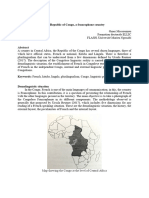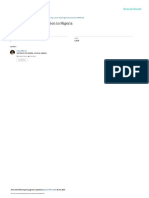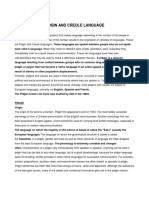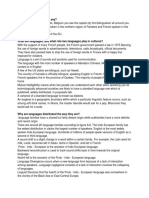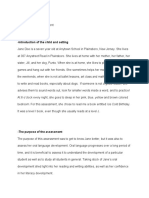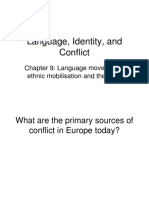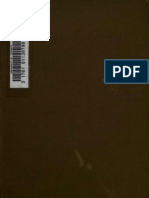MAC - Wolof
MAC - Wolof
Uploaded by
74t2qb27fpCopyright:
Available Formats
MAC - Wolof
MAC - Wolof
Uploaded by
74t2qb27fpCopyright
Available Formats
Share this document
Did you find this document useful?
Is this content inappropriate?
Copyright:
Available Formats
MAC - Wolof
MAC - Wolof
Uploaded by
74t2qb27fpCopyright:
Available Formats
UNIVERSITE GASTON BERGER Mr.
BALDE
UFR Civilisation, Religions, Arts et communication Année académique 2024-2025
Section: MAC
Licence 2
A historical product of French colonization, the Senegalese state formulated a hegemonic project,
primarily linguistic, of disseminating a literate and French-speaking “high culture”. This ideology has
become commonplace, from top to bottom, following the development of the postcolonial state.
However, this is only one side of national sentiment in Senegal, because the routinized and daily
reproduction of a national imagination has also taken the vernacular path of “low culture” conveyed
by the language, Wolof. In the space of a few decades, this language originally spoken by less than
half of the population of Senegal has undergone a process of devernacularization, until it became the
commonplace vehicular language of almost all citizens, finally become vernacularized, that is to say
once again becoming the support of a specific cultural identity, but this time extended to almost the
entire population, and which can therefore be described as national.
When Senegal gained independence in 1960, French, declared the sole official language, seemed well
placed to become the vehicle for national integration. But it is the Wolof language, kept aside by the
Senghorian state, which has gradually established itself as the language of national unification. The
exogenous and colonial origin of French is not a determining element in its failure to play this role,
because we know that several countries in Africa, Asia, or Latin America have reappropriated the
imported language, which has managed to become commonplace, certainly sometimes by becoming
creolized. In Senegal, three main reasons explain why the ordinary language prevailed over the
language of the State in the call for the identity of the postcolonial nation under construction.
Firstly, sociolinguistic surveys have clearly shown the existing divide in representations between
French, perceived as the language of social distinction, officiality, formality, the rigidity of the norm,
hierarchy, and verticality, and Wolof experienced as a language of horizontal sociability, spontaneous
communication, informality, linguistic and identity flexibility. The social and cultural prestige of
French has also been its handicap, making it incompatible with the sphere of everyday life, and
excluding it from convivial situations. French as a “working language” has suffered from its
officiality, from its inability to become commonplace by leaving the gangue of formality and
discipline. “In Wolof, we are not afraid of making mistakes, no one corrects you”: this remark on the
appeal of urban Wolof, an oral language above all, also implicitly reveals the disadvantages of French,
a written and official language. Mastery of Wolof has thus become a “guarantee of urban integration”,
perceived both as more “modern” than other Senegalese languages, and more flexible than official
French.
Exercise 1 Answer the following questions.
1-Give a title to the text.
2- Give the opposite of the underlined words.
3- Why is Wolof a means of urban integration?
4- Find in the text the synonyms of the following words:
a) assurance b) ordinary c) obviously d) summit e) whole f) source
Exercise 2 Say whether these statements are true or false; justify by quoting the text.
1-Senegalese people are very simple as far as the way they speak Wolof is concerned.
2- Wolof has nothing to do with socialization.
3- Wolof and French are equally spoken in Senegal.
4- French has become commonplace to the detriment of Wolof.
5- French is accessible to everyone, which is why it has become commonplace.
Exercise 4 Put the sentences into interrogative and interro-negative form
1- We are afraid of making mistakes.
2- This language originally spoken by the half of the Senegalese population
3- Wolof experienced as a horizontal sociability
4- The ordinary language prevailed over the language of the state
Exercise 3. Discussion.
1- Find other reasons why Wolof has prevailed over the French.
2- What could be the threat to the extension of the Wolof language?
You might also like
- UGRD-CS6207 Programming Languages With CompilerDocument9 pagesUGRD-CS6207 Programming Languages With CompilerBeautiful Nature Videos of Mother EarthNo ratings yet
- LINGUACOLONIALISM: SAVE THE AFRICAN SPECIES! by Abajuo Reason EmmaDocument22 pagesLINGUACOLONIALISM: SAVE THE AFRICAN SPECIES! by Abajuo Reason EmmaTrust EmmaNo ratings yet
- National Languages and Language PlanningDocument19 pagesNational Languages and Language PlanningAna Maria Garcia Rodriguez90% (20)
- Final Paper - Aya Grace AttoDocument9 pagesFinal Paper - Aya Grace AttoLolaNo ratings yet
- Cheikh NdiayeDocument7 pagesCheikh NdiayeAbdoul Wahab ZoromNo ratings yet
- How Languages DieDocument11 pagesHow Languages DieThiên TứNo ratings yet
- CRLC00512 PDFDocument27 pagesCRLC00512 PDFFabiola NDOUNGOUNo ratings yet
- 07.11.23 Sociolinguistics. Text - For StudentsDocument3 pages07.11.23 Sociolinguistics. Text - For Studentsgogukristina9No ratings yet
- 121 Top 10 Sociolinguistic Implications of Multi-Lingualism in East AfricaDocument12 pages121 Top 10 Sociolinguistic Implications of Multi-Lingualism in East AfricaNaomiNo ratings yet
- The Republic of Congo Francophone CountryDocument9 pagesThe Republic of Congo Francophone Countryomer.massoumouNo ratings yet
- 3rd Assignment Norhan Saad AliDocument11 pages3rd Assignment Norhan Saad Alinoor stampNo ratings yet
- Linguistic Varieties and Multilingual Nations: Ada Berfin Yıldız Merve Şevval Kurt Ayşe Sena ÖzenDocument30 pagesLinguistic Varieties and Multilingual Nations: Ada Berfin Yıldız Merve Şevval Kurt Ayşe Sena ÖzenAda YıldızNo ratings yet
- French SociolinguisticsDocument7 pagesFrench Sociolinguisticsapi-486353865No ratings yet
- 2007 Migge Leglise Language ColonialismDocument43 pages2007 Migge Leglise Language ColonialismChristone ZgamboNo ratings yet
- Lingua Franca English of South AfricaDocument9 pagesLingua Franca English of South AfricaDino Saurio CocoNo ratings yet
- Lounici Ali Blida University 2015/2016 Ksentini Rafik Academic Writing Assignment ThreeDocument1 pageLounici Ali Blida University 2015/2016 Ksentini Rafik Academic Writing Assignment ThreeMina AmounaNo ratings yet
- Meeting 4 SociolinguisticsDocument29 pagesMeeting 4 Sociolinguisticsgita lestari lestariNo ratings yet
- Standarts of English in AfricaDocument27 pagesStandarts of English in AfricaEliane MasonNo ratings yet
- French and Cultural Diplomacy - The African Experience.Document4 pagesFrench and Cultural Diplomacy - The African Experience.Alexander DeckerNo ratings yet
- SOCIOLINGUISTICS MIDTERM-LujánKDocument5 pagesSOCIOLINGUISTICS MIDTERM-LujánKMariasol NunezNo ratings yet
- Makalah Sociolinguistics (Pidgin and Creole) 2Document13 pagesMakalah Sociolinguistics (Pidgin and Creole) 2Lita Trii Lestari100% (1)
- Multilingualism: Multilingualism Is The Use of Two or MoreDocument7 pagesMultilingualism: Multilingualism Is The Use of Two or MoreIecc GolarchiNo ratings yet
- Socio UtsDocument10 pagesSocio UtsFenti TakasoniNo ratings yet
- Lecture 04 Contact Linguistics and Multilingualism Part OneDocument5 pagesLecture 04 Contact Linguistics and Multilingualism Part OneKim limNo ratings yet
- LIN 402 EDITED NOTE.pdfDocument19 pagesLIN 402 EDITED NOTE.pdfjesombahestherNo ratings yet
- MultilingualismDocument8 pagesMultilingualismKayssia VenstarNo ratings yet
- The Use of The Mother Tongue in Efl ClasDocument35 pagesThe Use of The Mother Tongue in Efl ClasFernandita Gusweni JayantiNo ratings yet
- Wolof Grammatical Sketch Robert PreprintDocument84 pagesWolof Grammatical Sketch Robert Preprintsileye1991No ratings yet
- Teaching Oral Skills in English As A Lingua FrancaDocument10 pagesTeaching Oral Skills in English As A Lingua FrancaabdullahNo ratings yet
- Presentation 05 - National Languages and Language PlanningDocument61 pagesPresentation 05 - National Languages and Language PlanningMirza MohammadNo ratings yet
- Linguistic Diversity AfricaDocument28 pagesLinguistic Diversity AfricaTewabeNo ratings yet
- Socio Linguistic PDFDocument26 pagesSocio Linguistic PDFDinda Pahira MNo ratings yet
- One Speaker Two Languages Cross Discipli (2) Milroy and MyskenDocument16 pagesOne Speaker Two Languages Cross Discipli (2) Milroy and MyskenKKNT Belaras2019No ratings yet
- AFRICAN Language SituationDocument8 pagesAFRICAN Language SituationBrad100% (1)
- Introduction To SociolinguisticsDocument12 pagesIntroduction To Sociolinguisticspus pusNo ratings yet
- An Introduction Into SociolinguisticsDocument5 pagesAn Introduction Into SociolinguisticsT-k SanaaNo ratings yet
- Chapter 4Document3 pagesChapter 4Baskhoro Edo PrastyoNo ratings yet
- Reflections On The Linguistic Landscape and The Prospects of English Language Teaching in AlgeriaDocument9 pagesReflections On The Linguistic Landscape and The Prospects of English Language Teaching in AlgeriaTahar MeklaNo ratings yet
- FRENCHLANGUAGEEDUCATIONINNIGERIADocument15 pagesFRENCHLANGUAGEEDUCATIONINNIGERIAUzordinma OhanuNo ratings yet
- Anglais Énoncé - BAC Série A2 (SchoolExam)Document3 pagesAnglais Énoncé - BAC Série A2 (SchoolExam)Michael KassifaNo ratings yet
- 100 Words Definitions For Exam Questions PDFDocument7 pages100 Words Definitions For Exam Questions PDFSusanaNo ratings yet
- 100 Words Definitions For Exam Questions PDFDocument7 pages100 Words Definitions For Exam Questions PDFSusanaNo ratings yet
- History of English LanguageDocument43 pagesHistory of English Languagekazmi81100% (1)
- Sociolinguistics Notes Monolingualism Multilingualism Legon 2015 ClassDocument23 pagesSociolinguistics Notes Monolingualism Multilingualism Legon 2015 ClassHassan AbdallaaNo ratings yet
- Chapter 3, 4Document14 pagesChapter 3, 4anmar ahmedNo ratings yet
- Lesson 5 Language Shift and MaintenanceDocument9 pagesLesson 5 Language Shift and MaintenanceLee ShaneNo ratings yet
- Global Language PracticesDocument20 pagesGlobal Language PracticesWaffa Shahzad100% (1)
- The Use of English As The Global Language Is Interfering With National Identity Issues. Discuss and Give Your OpinionDocument3 pagesThe Use of English As The Global Language Is Interfering With National Identity Issues. Discuss and Give Your OpinionCarmen Maria Tebar PlazaNo ratings yet
- Endangered Languages, Sociolinguistics, and Linguistic Sentimentalism Abram de SwaanDocument14 pagesEndangered Languages, Sociolinguistics, and Linguistic Sentimentalism Abram de Swaanavid2chatNo ratings yet
- Pidgins and CreolesDocument7 pagesPidgins and CreolesAtiq Aslam100% (1)
- Why Need A Global LanguageDocument4 pagesWhy Need A Global LanguageGabriel Dan BărbulețNo ratings yet
- Presentation 05 National Languages and Language PlanningDocument61 pagesPresentation 05 National Languages and Language Planningimqueen997No ratings yet
- Linguistic Varieties and Multilingual NationsDocument6 pagesLinguistic Varieties and Multilingual NationsDesi Puspasari100% (3)
- Vernacular Language Vs Standardized LanguageDocument3 pagesVernacular Language Vs Standardized LanguageMuhamad Ramdhani0% (1)
- Pidgin and Creole LanguageDocument5 pagesPidgin and Creole LanguageTwinkle SoniNo ratings yet
- The Language of Love - 2Document11 pagesThe Language of Love - 2ByeNo ratings yet
- HuGap Chapter 6Document2 pagesHuGap Chapter 6William AshleyNo ratings yet
- What Is A Global LanguageDocument12 pagesWhat Is A Global LanguagecrevanmartresNo ratings yet
- What Are The Causes of Language ExtinctionDocument4 pagesWhat Are The Causes of Language ExtinctionSabina SergeyNo ratings yet
- Master Basic French Today: Introductory LessonsFrom EverandMaster Basic French Today: Introductory LessonsRating: 5 out of 5 stars5/5 (1)
- Subject Verb AgreementDocument28 pagesSubject Verb AgreementNavin ZachariahNo ratings yet
- Priprema Za Test Iz EngleskogDocument22 pagesPriprema Za Test Iz EngleskogmilaNo ratings yet
- 當代1 第一課 文法Document25 pages當代1 第一課 文法Romit SarkarNo ratings yet
- Krisananuwat Up4Document3 pagesKrisananuwat Up4api-437393622No ratings yet
- Review 1: Part 1. Key Concepts in Sociolinguistics Chapter 1. Introduction Prescriptive Grammar/Descriptive GrammarDocument17 pagesReview 1: Part 1. Key Concepts in Sociolinguistics Chapter 1. Introduction Prescriptive Grammar/Descriptive GrammarTú TúNo ratings yet
- Subordinating Conjunctions Mr. RamiDocument10 pagesSubordinating Conjunctions Mr. Ramifzwhx6zmvtNo ratings yet
- 17 - Iwn - Manipuri Kinship TermsDocument5 pages17 - Iwn - Manipuri Kinship TermsJammyMaisnamNo ratings yet
- Narrative TextDocument20 pagesNarrative Textyulia astutiNo ratings yet
- ἰδίωμα - idiōma, "special feature, special phrasing", ἴδιος - idios, "one's own") is an expression,Document8 pagesἰδίωμα - idiōma, "special feature, special phrasing", ἴδιος - idios, "one's own") is an expression,Jayr CagasNo ratings yet
- Out of The Woods in WritingDocument25 pagesOut of The Woods in WritingKarolina CiNo ratings yet
- Guia N4 Actividad Vanessa InglesDocument9 pagesGuia N4 Actividad Vanessa InglesVanessa RojasNo ratings yet
- Week 2 - S1 - PronounsDocument12 pagesWeek 2 - S1 - PronounsTechnical InformationNo ratings yet
- Metro Level 3 2B Two StarsDocument3 pagesMetro Level 3 2B Two Starsclau pasNo ratings yet
- IELTS Writing Task 2/ IELTS EssayDocument2 pagesIELTS Writing Task 2/ IELTS EssayOlya HerasiyNo ratings yet
- Reported Speech - TeorieDocument4 pagesReported Speech - TeorieMargineanu SimonaNo ratings yet
- Cambridge Grammar of English - Types of VerbsDocument19 pagesCambridge Grammar of English - Types of VerbsJeremias BarriosNo ratings yet
- Lenition and Contrast The Functional Consequences of Certain Phonetically Conditioned Sound Changes 1st Edition Naomi GurevichDocument84 pagesLenition and Contrast The Functional Consequences of Certain Phonetically Conditioned Sound Changes 1st Edition Naomi Gurevichkurmazsifter100% (3)
- AI Chapter 6 and 7 NewDocument48 pagesAI Chapter 6 and 7 NewAschalew AyeleNo ratings yet
- Spelling Rules: September 14th, 2013Document8 pagesSpelling Rules: September 14th, 2013Rafa SerranoNo ratings yet
- 6 Descriptive article-2DayagDita2012 PDFDocument23 pages6 Descriptive article-2DayagDita2012 PDFChristine Jane TrinidadNo ratings yet
- He Isn't Here, Is He? Use A Negative Question TagDocument1 pageHe Isn't Here, Is He? Use A Negative Question TagMariana TorresNo ratings yet
- Oral Language AssessmentDocument3 pagesOral Language AssessmentChristine OBrienNo ratings yet
- Cla 302Document133 pagesCla 302damloxventuresNo ratings yet
- HL 2140 SP Manual PartesDocument30 pagesHL 2140 SP Manual Partesantonio_motta_7No ratings yet
- Census of India 2011 PDFDocument52 pagesCensus of India 2011 PDFPavithran Velu RavivarmanNo ratings yet
- Httpbalvikasschoolpanipat - Edu.inwp Contentuploads202204Class 7.PDF 3Document61 pagesHttpbalvikasschoolpanipat - Edu.inwp Contentuploads202204Class 7.PDF 3kqxx8dv9kcNo ratings yet
- Language, Identity, and Conflict: Chapter 9: Language Movements, Ethnic Mobilisation and The StateDocument13 pagesLanguage, Identity, and Conflict: Chapter 9: Language Movements, Ethnic Mobilisation and The StatesehrishNo ratings yet
- Lesson Plan Week of 11-26-12Document1 pageLesson Plan Week of 11-26-12cmbrown8605No ratings yet
- Palgrave, Ellwood and Rye 1894 Glossary of Words Used in DurhamDocument438 pagesPalgrave, Ellwood and Rye 1894 Glossary of Words Used in DurhamMichaelPearceNo ratings yet









